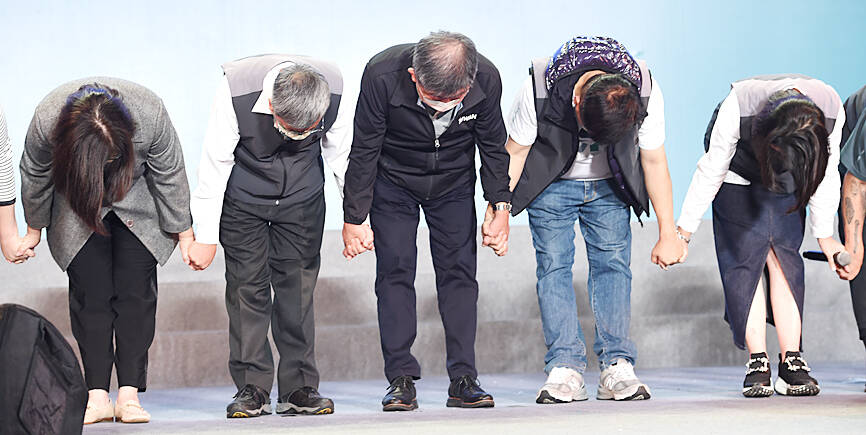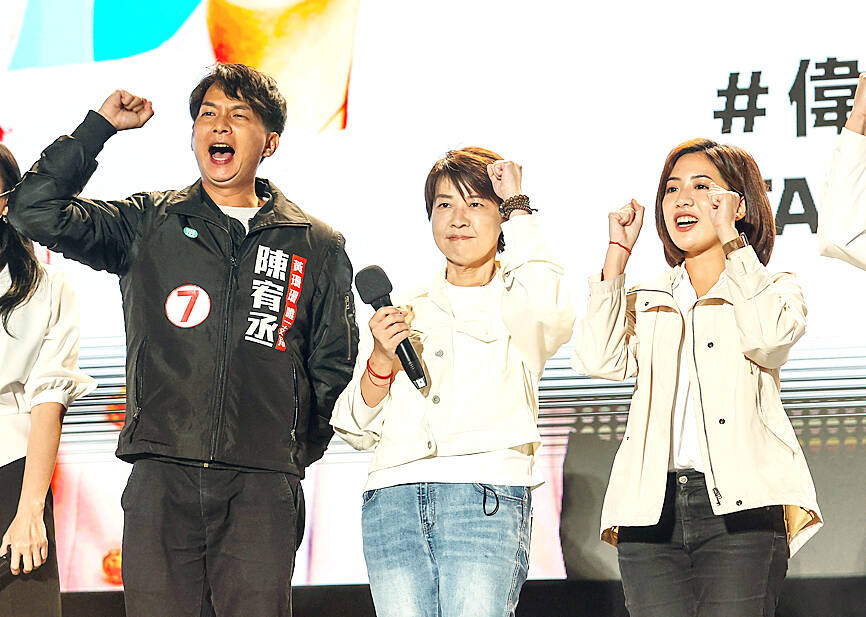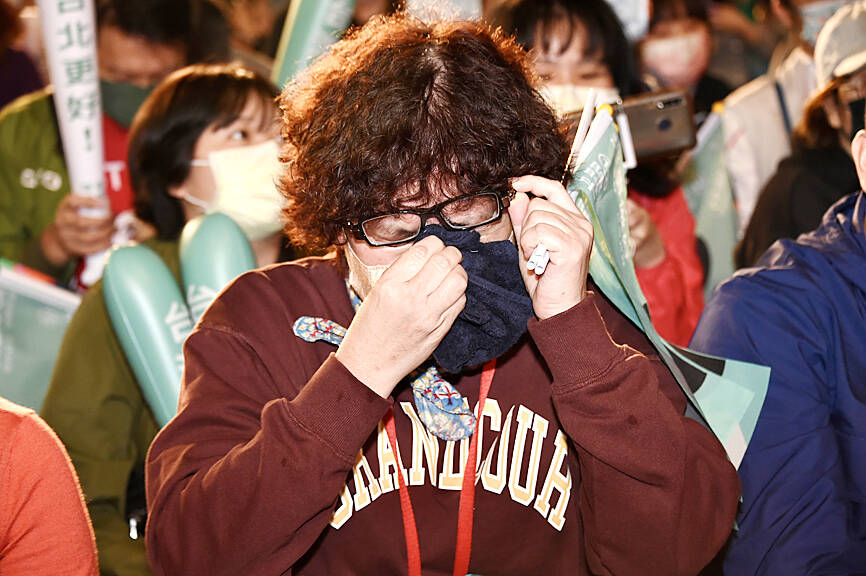Legislator Chiang Wan-an (蔣萬安) yesterday won the Taipei mayoral election, with the Chinese Nationalist Party (KMT) candidate defeating the Democratic Progressive Party’s (DPP) pick, former minister of health and welfare Chen Shih-chung (陳時中), and former Taipei deputy mayor Vivian Huang (黃珊珊), an independent.
After polling stations closed at 4pm, the Taipei Election Commission issued a preliminary estimate that voter turnout in the city was about 64 percent, slightly lower than in 2018.
Chiang, 43, is to be the youngest Taipei mayor ever, with the KMT regaining the capital after eight years.

Photo: Fang Pin-chao, Taipei Times
Chen had an exceptionally high national approval rating when he was head of the Central Epidemic Command Center during the first two years of the COVID-19 pandemic.
However, he failed to counter critics throughout his campaign involving local COVID-19 outbreaks and vaccine issues.
At about 7pm, Chen conceded defeat to Chiang and apologized to his supporters for disappointing them, repeatedly thanking them for their backing.

Photo: Liu Hsin-te, Taipei Times
“Whenever I see everyone looking at me with eyes full of expectation, how I wish I could realize our collective dreams and set this city on a new path toward change, but Taipei residents have chosen another future mayor, so I hope everyone can join me in sincerely congratulating Chiang Wan-an,” he said.
He said he had called Chiang to congratulate him and hopes everyone can come together, irrespective of their political preferences, to support Chiang in doing a good job of governing Taipei.
Chen said he hoped criticism of Taiwan’s COVID-19 prevention efforts would stop after the elections, as the city and the nation must move forward.

Photo: CNA
He also urged his supporters to continue supporting President Tsai Ing-wen (蔡英文) to maintain a steady pace in the face of post-pandemic economic challenges.
At about 7:20pm, Huang also conceded defeat and thanked her supporters for “fighting a good fight” with her.
Although the result was below expectations, she would continue to focus on people and push political parties to the side, dedicating her life to her hometown, Taipei, she said.

Photo: CNA
She also urged Chiang to keep his word and accomplish his campaign promises, enabling Taipei to progress further.
At about 8pm, Chiang declared victory, saying that it was not his victory, but rather Taipei residents voting to ensure that honesty defeated lies, democracy defeated black-box operations and light defeated darkness.
He said he highly respects Huang and Chen, and thanked them for pointing out policy directions during campaigning.

Photo: Tu Chien-jung, Taipei Times
They set a good example regarding democracy, allowing the election to proceed smoothly, Chiang said.
He said he was thankful to his supporters for trusting him and placing Taipei’s future in his hands, but he was also thankful to those who did not vote for him, as they would monitor him, so his team would be humble and try their hardest over the next four years.
In the 2018 local elections, Ko Wen-je (柯文哲) won a narrow victory by 3,567 votes to become mayor, defeating former legislator Ting Shou-chung (丁守中) of the KMT.

Photo: Tien Yu-hua, Taipei Times
The final result was announced after 2am the next morning.
With a voter turnout of 65.95 percent that year, Ko, who served two terms, received 580,663 votes, or 41.07 percent, while Ting garnered 577,096 votes, or 41.07 percent.


Taiwan has received more than US$70 million in royalties as of the end of last year from developing the F-16V jet as countries worldwide purchase or upgrade to this popular model, government and military officials said on Saturday. Taiwan funded the development of the F-16V jet and ended up the sole investor as other countries withdrew from the program. Now the F-16V is increasingly popular and countries must pay Taiwan a percentage in royalties when they purchase new F-16V aircraft or upgrade older F-16 models. The next five years are expected to be the peak for these royalties, with Taiwan potentially earning

STAY IN YOUR LANE: As the US and Israel attack Iran, the ministry has warned China not to overstep by including Taiwanese citizens in its evacuation orders The Ministry of Foreign Affairs (MOFA) yesterday rebuked a statement by China’s embassy in Israel that it would evacuate Taiwanese holders of Chinese travel documents from Israel amid the latter’s escalating conflict with Iran. Tensions have risen across the Middle East in the wake of US and Israeli airstrikes on Iran beginning Saturday. China subsequently issued an evacuation notice for its citizens. In a news release, the Chinese embassy in Israel said holders of “Taiwan compatriot permits (台胞證)” issued to Taiwanese nationals by Chinese authorities for travel to China — could register for evacuation to Egypt. In Taipei, the ministry yesterday said Taiwan

Taiwan is awaiting official notification from the US regarding the status of the Agreement on Reciprocal Trade (ART) after the US Supreme Court ruled US President Donald Trump's global tariffs unconstitutional. Speaking to reporters before a legislative hearing today, Premier Cho Jung-tai (卓榮泰) said that Taiwan's negotiation team remains focused on ensuring that the bilateral trade deal remains intact despite the legal challenge to Trump's tariff policy. "The US has pledged to notify its trade partners once the subsequent administrative and legal processes are finalized, and that certainly includes Taiwan," Cho said when asked about opposition parties’ doubts that the ART was

If China chose to invade Taiwan tomorrow, it would only have to sever three undersea fiber-optic cable clusters to cause a data blackout, Jason Hsu (許毓仁), a senior fellow at the Hudson Institute and former Chinese Nationalist Party (KMT) legislator, told a US security panel yesterday. In a Taiwan contingency, cable disruption would be one of the earliest preinvasion actions and the signal that escalation had begun, he said, adding that Taiwan’s current cable repair capabilities are insufficient. The US-China Economic and Security Review Commission (USCC) yesterday held a hearing on US-China Competition Under the Sea, with Hsu speaking on